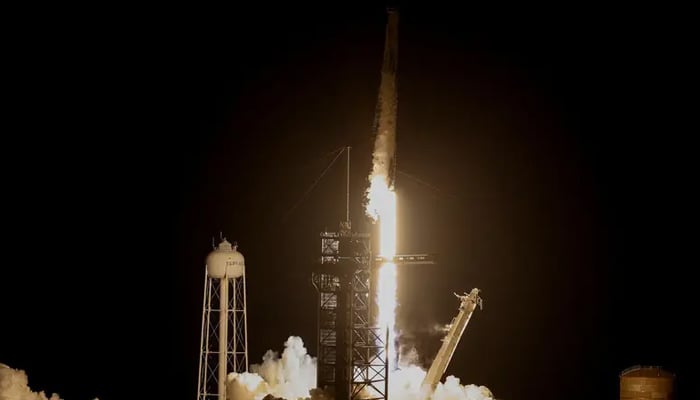Select Language:

OSLO: The inaugural orbital rocket launch from mainland Europe ended in failure just seconds after liftoff on Sunday, marking a significant moment for the continent’s aspirations to advance its space economy.
The Spectrum rocket, designed by the German start-up Isar Aerospace, emitted smoke from its sides before plummeting back to Earth with a deafening bang shortly after its launch from Norway’s Andoya Spaceport in the Arctic, as seen in a live YouTube broadcast.
While Isar Aerospace had previously indicated that they did not anticipate reaching orbit this time, they confirmed that the two-stage rocket fell into the sea, noting that “the launch pad appears to be unharmed.”
Andoya Space, the Norwegian public company in charge of the spaceport, reported that “crisis response” protocols were initiated following the “incident.”
No injuries or damages beyond the rocket itself were reported, according to regional police.
Orbital rockets are built to place payloads like satellites into or beyond Earth’s orbit.
‘Great success’
Before the launch, which faced multiple delays due to weather, Isar Aerospace had tempered expectations, clarifying that achieving orbit was not the goal for their first attempt.
“Our initial test flight met all our expectations and achieved great success. We experienced a smooth liftoff, 30 seconds of flight, and were even able to validate our Flight Termination System,” said Daniel Metzler, co-founder and CEO of the company.
Isar Aerospace indicated that two additional Spectrum rockets are currently in development.
The rocket, standing at 28 meters (about 92 feet) tall and 2 meters in diameter, has a capacity of one ton but was unladen for this test flight.
This launch represented the first orbital launch attempt from the European continent, excluding Russia, and marked Europe’s first effort primarily financed by the private sector.
“Today is a notable day for space travel in Germany and Europe,” stated Robert Habeck, Germany’s Economics Minister.
“Isar Aerospace has the potential to play a crucial role in ensuring Europe has independent access to space.”
The first European orbital launch attempt was made in 2023 by billionaire Richard Branson’s Virgin Orbit, which aimed to use a Boeing 747 to position a rocket into orbit from southwestern England but ultimately failed, leading to the company’s dissolution.
New Space
Since Russia’s invasion of Ukraine in 2022, Europe has lost access to Russian space stations and launch vehicles, causing a significant rift in diplomatic relations.
The European space industry has also experienced delays in the development of the Ariane 6 rocket and the halt of the Vega-C satellite launcher due to an accident.
It was not until March 6 that Europe regained its launch capability with the successful commercial flight of an Ariane 6 rocket from French Guiana, several months after losing its own access to space.
While the U.S. is home to major players like Elon Musk’s SpaceX and Jeff Bezos’s Blue Origin, Europe’s private-sector driven commercial space initiatives—often referred to as “New Space”—are still in their early stages.
Founded in 2018 in Munich, Isar Aerospace is competing alongside other European firms such as Germany’s HyImpulse and Rocket Factory Augsburg (RFA), France’s Latitude and MaiaSpace, and Spain’s PLD Space, all striving to establish a strong foothold in the sector.
According to a commentator from Isar Aerospace, Sunday’s launch produced “tons of data that the teams can now analyze and learn from.”
Alongside the development of new rockets, several spaceport projects are springing up across Europe, from the Azores in Portugal to the Shetland Islands in the UK, Norway’s Andoya, and Esrange in Sweden, each vying to become the first to launch.




